The shrinking capital of a stagnating county, Pingtung City (屏東市) hasn’t found its way on to any kind of top 10 tourist attractions list.
Foreign visitors spending a few weeks in Taiwan — remember them? — aren’t likely to set foot in the city. Silver-haired culture vultures and beach-bound backpackers zip through Pingtung City by express train, or bypass it on Freeway 3. The popularity of Kenting National Park and nearby Aboriginal villages doesn’t seem to generate way-station business for the seat of the county government.
However, facets of this municipality of about 197,000 (down 9 percent in the past 15 years) will intrigue hardcore Taiwanophiles.
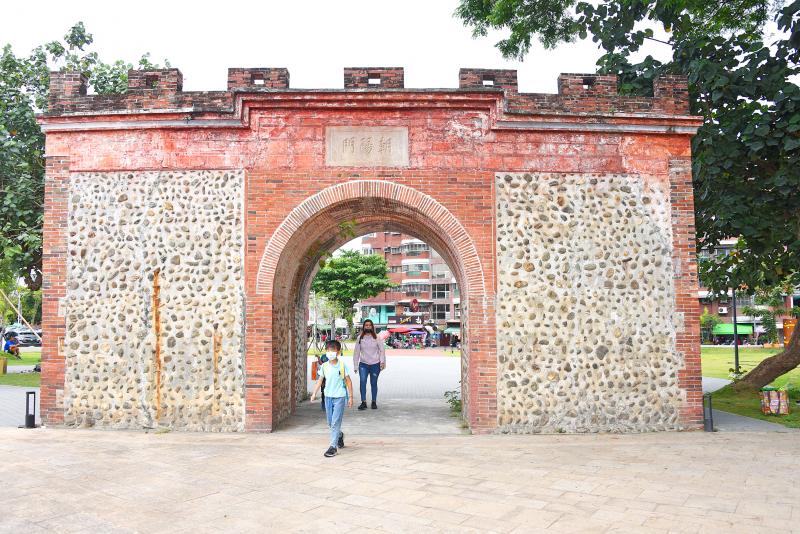
Photo: Yeh Yung-chien, Taipei Times
The city’s most photogenic neighborhood is an extension of the 101-year-old air force base west of downtown Pingtung.
VIP ZONE
What was known for much of the postwar period as Shengli New Village (勝利新村) is now promoted as VIP Zone (勝利星村創意生活園區). For decades, senior air force offices and their families were housed in this leafy cantonment 950m north of Pingtung Railway Station.
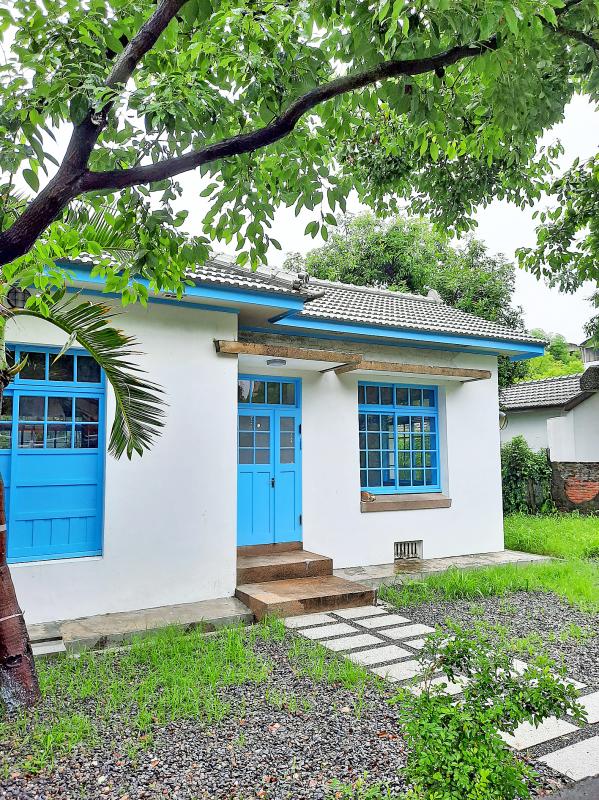
Photo: Steven Crook
By mid-20th century standards, the homes are quite spacious. By 21st century standards, many have yards only millionaires can afford.
Part of the neighborhood has been cleared for redevelopment, but dozens of pre and postwar houses have been preserved in the vicinity of Jhongshan Road (中山路), Cingdao Street (青島街), and Chongcing Road (重慶路). The last of these street names honors the temporary capital of Nationalist China during World War II.
No 61 Jhongshan Road, built in 1937 for a Japanese squadron commander, is notable for its association with General Sun Li-jen (孫立人, 1900-1990), a US-educated military leader hailed as the “Rommel of the East” during World War II.
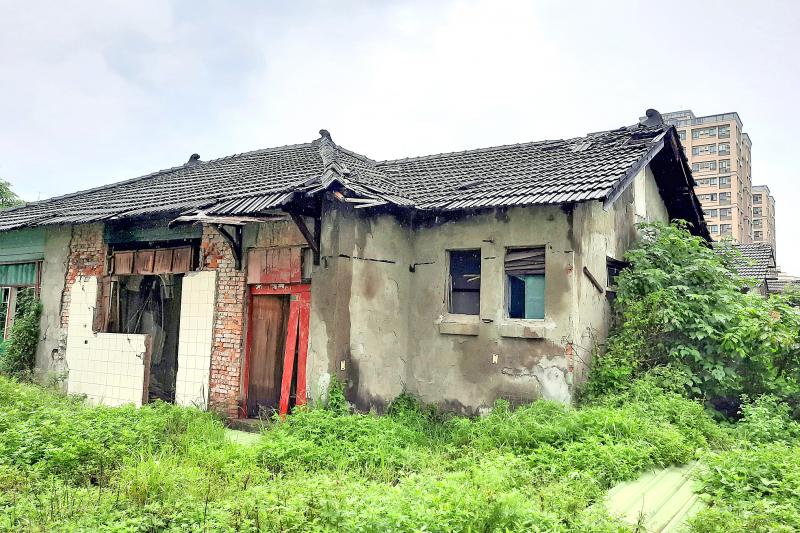
Photo: Steven Crook
Sun lived there some years after he’d won fame by fighting the Japanese in Burma, and just before his disastrous falling out with Chiang Kai-shek (蔣介石). Between 1955 and 1988, he was kept under virtual house arrest in Taichung.
Like similarly historic government-owned neighborhoods in other cities — Chiayi’s Hinoki Village (檜意森活村) comes to mind — the authorities are trying to turn VIP Zone in a cultural/creative industries cluster.
In 2019, when the Taiwan Design Expo was held at Taisugar Civic Park (台糖縣民公園) on the southern outskirts of Pingtung City, VIP Zone served as a satellite venue.
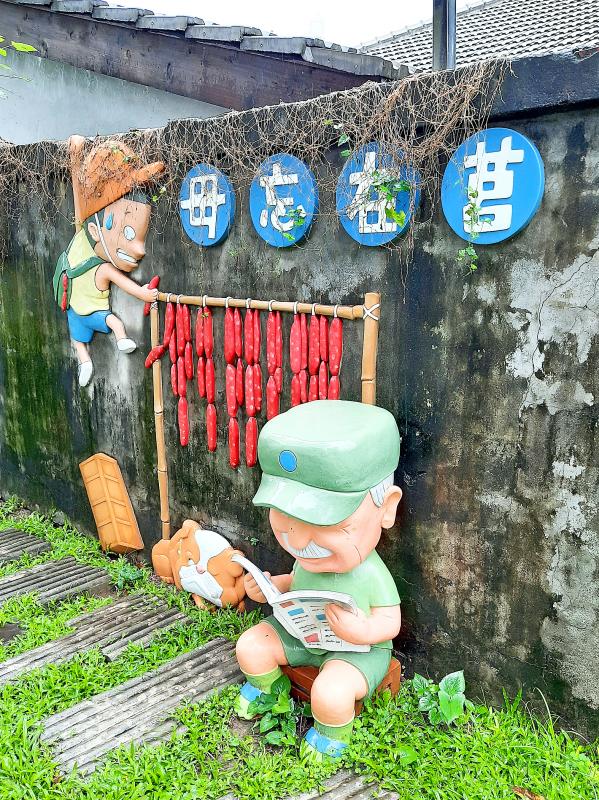
Photo: Steven Crook
Turnover among VIP Zone’s eateries and art galleries seems quite high, judging by the changes I noticed between my first visit and my most recent nosing around. The eye-catching “Flying Tigers” themed restaurant I saw in 2017 is no more, but that’s not to say the neighborhood lacks color.
The mural of a tank smashing through a wall impressed me. I had mixed feelings, however, about the fiberglass depiction of Chiang Kai-shek as a schoolboy in short pants. How would you feel if members of your family had been imprisoned or murdered by Chiang’s regime?
DONGSHAN TEMPLE
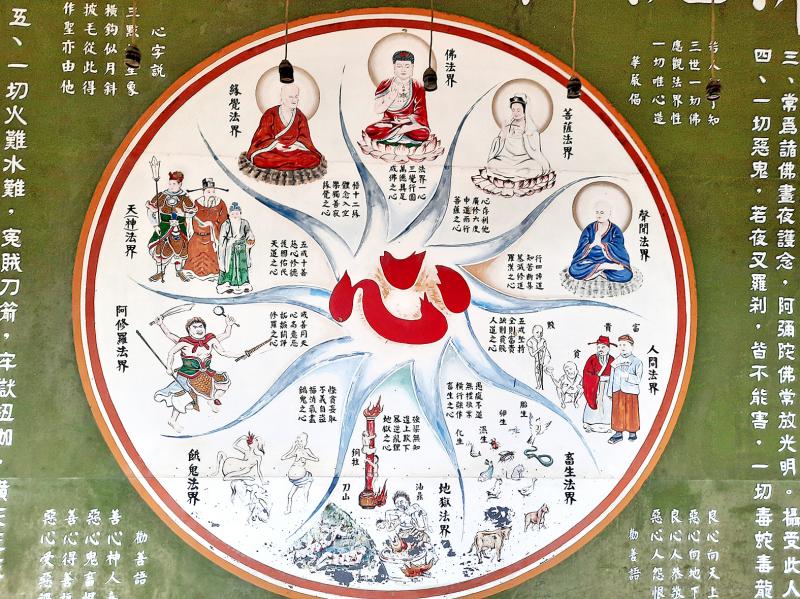
Photo: Steven Crook
Located just east of VIP Zone at No 6, Suide Lane, Jhongsiao Road (忠孝路修德巷), Dongshan Temple (東山寺) is a high-security Buddhist outpost.
Well before the recent wave of COVID-19 community transmission, razor wire kept unwelcome visitors out of the compound and the temple’s parking lot. When I arrived, well before level 3 restrictions were imposed, most of the entrances were blocked by rolling steel doors. Yet once I’d found a way in, I was warmly greeted by a janitor.
I spent several minutes absorbing a circular visual depiction of the Ten Realms (十界) of Buddhism. At the top, naturally, are the elevated realms, including Buddhahood and the state attained by bodhisattvas. At the very bottom are, from left to right, the realms of beasts (which here include snakes, insects and fish), hungry spirits and hell dwellers.
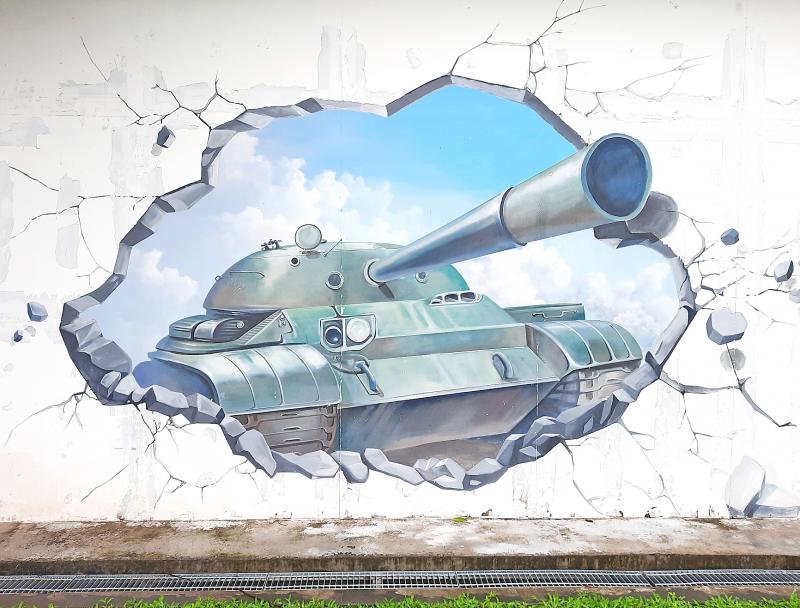
Photo: Steven Crook
If graphic illustrations of the tortures which await hellbound wrongdoers inspire you to engage in self-cultivation, you’re in luck.
PINGTUNG LIBRARY
Those who live in or visit Pingtung are able to enjoy one of Taiwan’s most attractive libraries. Between 2018 and 2020, Pingtung County Cultural Affairs Bureau Library (屏東縣立圖書館總館) was tastefully made over. Glimpsed through the camphor trees that shade Millennium Park (千禧公園), its remodeled exterior looks both contemporary and elegant.
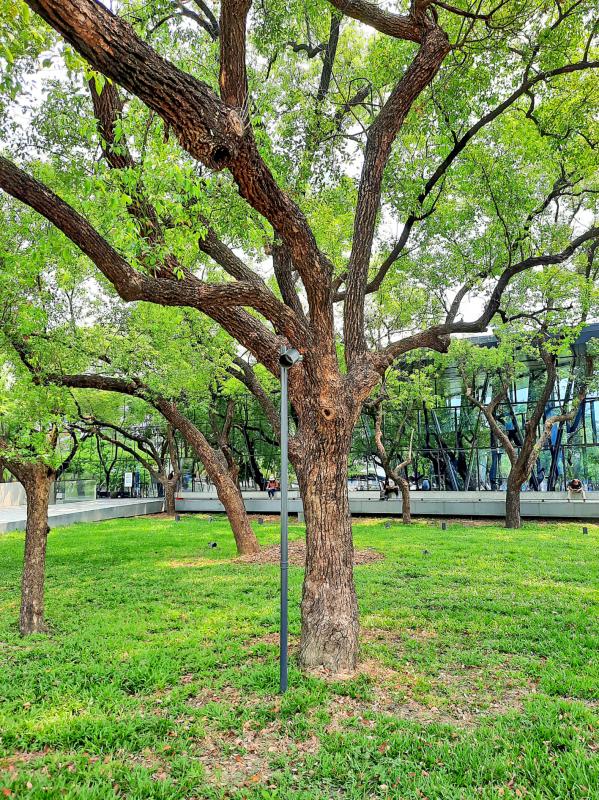
Photo: Steven Crook
Seating capacity has been greatly expanded, and the book collection has tripled in size. On the fourth floor, there’s a reading area decorated with Paiwan tribal motifs.
If you plan to hoof it from VIP Zone to the library (it’ll take you about half an hour), or from the train/bus hub, you might as well stop at A-Hou East Gate (阿猴城東門), a photogenic remnant that dates from around 1836.
Like several other settlements in Taiwan’s western half, Pingtung — then known as A-Hou (阿猴) or Yahou (雅猴) — was protected from irate Aborigines and rebel armies by a permanent barricade. During the first half of the 1895-1945 period of Japanese colonial rule, the entire wall, and every gate except this one, were demolished so urban planners could straighten and widen the city’s streets.
The East Gate has obviously been repaired a few times. It looks a bit too perfect to be convincing, yet it’s an appealing little landmark. Relics like the gate, public facilities like the library, and repurposed dormitories like those in VIP ZONE: A lack of tourists is no reason why the good people of Pingtung City shouldn’t have nice things.
Steven Crook has been writing about travel, culture and business in Taiwan since 1996. He is the author of Taiwan: The Bradt Travel Guide and co-author of A Culinary History of Taipei: Beyond Pork and Ponlai.

The low voter turnout for the referendum on Aug. 23 shows that many Taiwanese are apathetic about nuclear energy, but there are long-term energy stakes involved that the public needs to grasp Taiwan faces an energy trilemma: soaring AI-driven demand, pressure to cut carbon and reliance on fragile fuel imports. But the nuclear referendum on Aug. 23 showed how little this registered with voters, many of whom neither see the long game nor grasp the stakes. Volunteer referendum worker Vivian Chen (陳薇安) put it bluntly: “I’ve seen many people asking what they’re voting for when they arrive to vote. They cast their vote without even doing any research.” Imagine Taiwanese voters invited to a poker table. The bet looked simple — yes or no — yet most never showed. More than two-thirds of those

In the run-up to the referendum on re-opening Pingtung County’s Ma-anshan Nuclear Power Plant last month, the media inundated us with explainers. A favorite factoid of the international media, endlessly recycled, was that Taiwan has no energy reserves for a blockade, thus necessitating re-opening the nuclear plants. As presented by the Chinese-language CommonWealth Magazine, it runs: “According to the US Department of Commerce International Trade Administration, 97.73 percent of Taiwan’s energy is imported, and estimates are that Taiwan has only 11 days of reserves available in the event of a blockade.” This factoid is not an outright lie — that

Cheng Ching-hsiang (鄭青祥) turned a small triangle of concrete jammed between two old shops into a cool little bar called 9dimension. In front of the shop, a steampunk-like structure was welded by himself to serve as a booth where he prepares cocktails. “Yancheng used to be just old people,” he says, “but now young people are coming and creating the New Yancheng.” Around the corner, Yu Hsiu-jao (饒毓琇), opened Tiny Cafe. True to its name, it is the size of a cupboard and serves cold-brewed coffee. “Small shops are so special and have personality,” she says, “people come to Yancheng to find such treasures.” She

Former Chinese Nationalist Party (KMT) chairwoman Hung Hsiu-chu’s (洪秀柱) attendance at the Chinese Communist Party’s (CPP) “Chinese People’s War of Resistance Against Japanese Aggression and the World Anti-Fascist War” parade in Beijing is infuriating, embarrassing and insulting to nearly everyone in Taiwan, and Taiwan’s friends and allies. She is also ripping off bandages and pouring salt into old wounds. In the process she managed to tie both the KMT and the Democratic Progressive Party (DPP) into uncomfortable knots. The KMT continues to honor their heroic fighters, who defended China against the invading Japanese Empire, which inflicted unimaginable horrors on the